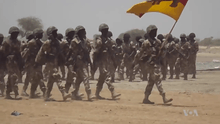3rd Division (Nigeria)
3rd Armoured Division is a division of the Nigerian Army. The division is headquartered at Jos, Plateau State.

The 3rd Division of the Nigerian Army dates to August–September 1967 during the Nigerian Civil War. At that time 1 Area Command at Kaduna was redesignated 1 Infantry Division, 2 Division was formed under Colonel Murtala Mohammed, and the then Lagos Garrison Organisation was renamed 3 Infantry Division, later to be renamed 3 Marine Commando under Colonel Benjamin Adekunle.[1]
Then-Colonel Olusegun Obasanjo took over command of 3 Division from Benjamin Adekunle on 12 May 1969.[2] He carried out a thorough reorganisation of the division's administration and eliminated the sector level of command which had been operating between the division and brigade level.[3] He also formed a new reserve battalion, the Special Task Force, later to become 'Apollo Battalion' after the Apollo 11 moon landing of 20 July 1969, which was not to be used for ground-holding duties.[4]
At the end of the Civil War, the three divisions of the army were reorganised into four divisions, with each controlling territories running from North to South in order to deemphasise the former regional structure. Each division thus had access to the sea thereby making triservice cooperation and logistic support easier. This deployment formula was later abandoned in favour of the present assignment of sectors to the divisions. Thus 1 Division with HQ at Kaduna is allocated the North West sector; 2 Division with HQ at lbadan South West sector, 3 Division with HQ at Jos North East sector and 82 Division with HQ at Enugu South East sector.
3rd Armoured Division was responsible in 1983 for the security of areas bordering Chad.[5]
From October 22 to 24, 2001, several hundred Army soldiers of the Yola Brigade (23 Brigade) of 3rd Armoured Division killed more than two hundred unarmed civilians and destroyed homes, shops, public buildings and other property in more than seven towns and villages in Benue State, in central eastern Nigeria. The 72nd Special Forces Battalion appears to have tried to intercede with the Yola Brigade to avoid further killings, in the midst of the events.[6]
3rd Armoured Division's headquarters is at Rukuba Cantonment, Jos, Plateau State, in the North-East, and includes 21 Armoured Brigade Maiduguri, 23 Armoured Brigade Yola, and 33 Artillery Brigades[7] (which appears to include 331 and 332 Field Artillery Regiments). 23 Brigade appears to include 231 and 232 Tank Battalions.
Main battle tanks in Nigerian service include the T-72 and T-54/55 (together seemingly 36 vehicles in service) and over 100 Vickers Mark 3s.
Currently, as of November 2018, Maj Gen Nuhu Angbazo who was the former Chief of Civil Military Affairs at the Nigerian Army Headquarters was appointed by the Chief of Army Staff, Lt Gen Tukur Buratai as the General Officer Commanding (GOC) of the 3 Division. His appointment came few days after co-hosting a social media event in Port Harcourt with Security Affairs Analyst and Defence Correspondent, Austin Peacemaker (CEO 'Security Affairs' www.securityaffairstvs.com) for bloggers, online journalists and social media influencers in a bid to cub fake news and promote balanced reportage in the armed forces of Nigeria. Gen Angbazo is described as an exceptional officer and a strategic leader by all his colleagues in the Army.
Notes
- General Olusegun Obasanjo, 'My Command: An Account of the Nigerian Civil War 1967-70,' Heinemann, Ibadan/London/Nairobi, p.18 (Via Joint Services Command and Staff College Library)
- Obasanjo, My Command, Prestige (paperback), 1980, 83-84.
- Obasanjo, 1980 paperback edition, 92-114, 123-126.
- Obasanjo, 1980 paperback edition, 126-7. This Special Task Force should not be confused with a previous Special Task Force that was a provisional brigade that was eliminated in the process of eliminating the sectors.
- Jimi Peters, The Nigerian military and the state, I.B. Tauris, 1997, p.174, via Google Books
- Human Rights Watch, [Military Revenge in Benue: A Population Under Attack, April 2002, Vol 14 (2) A.
- Nigerian Army 3 Division, verified October 2008
References
- Olusegun Obasanjo, 'My Command: An Account of the Nigerian Civil War 1967-70,' Heinemann, Ibadan/London/Nairobi